Ah, social media advertising… those delightful interruptions in our feed & YouTube videos. As someone knee-deep in the world of photography, film production, and running ads, I’ve seen my fair share of cringeworthy attempts to grab attention.
It’s like they think we’re all brain-dead zombies.
How You SHOULD Be Advertising Your Business
I founded my agency on a different principle: respect for the audience’s intelligence. Sure, captivating visuals play a crucial role, but let’s not lose sight of the real goal here – selling your product or service.
While others may swear by singing jingles and creating cute hashtags, I’m all about substance. You won’t catch me peddling fluff. Instead, I pack my ad copy with information that consumers actually need to know. Because let’s face it, your customers aren’t idiots.
Instead of criticizing others’ attempts at creating ads, I’ll provide you with solutions and examples for crafting high-quality advertisements for your business.
The Real Secret To Making Advertisements That Sell
This advice will be the opposite of what you’ll find with other agencies or search engines. Let’s look at the first Google snippet when you ask “should social media ad copy be long or short?”:
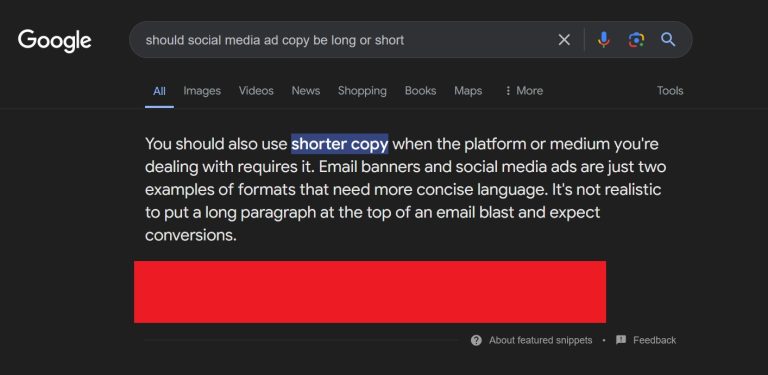
I blocked out the company who wrote this article because I’m not here to tear down other agencies. I’m here to dispel common myths about social media advertising and help you get much better results.
You know which ads historically performed best? It was those late night infomercials that showcased products being used in various ways and people trying them out for themselves. For example, 21 years ago there was an infomercial for a blender called the “Magic Bullet”. Although it’s super cringy to watch now.. they showed their product in use AND guaranteed the results or your money-back.
Back in the days when most people watched TV, long before social media advertising & Amazon was popular.

I remember ordering one of those bad boys and still use it to this day.
Remember, good advertising isn’t about being a clown on camera or crafting slogans that belong in a kindergarten sing-along. It’s about providing value, answering questions, and addressing concerns head-on. That’s where long-form copywriting comes into play.
How To Write Long Form Ad Copy That Brings In The Cash
Long-form copywriting isn’t just about filling space with words. It’s about weaving a narrative that hooks the reader, educates them, and earns their trust – imagine an ad that reads like a conversation between two friends. No frills, no gimmicks, just straight-up information that helps your audience make an informed decision.
Do you still believe people WON’T READ A LONG AD? Here’s an example of a social media ad campaign I ran for an Italian restaurant. I always place the clickable link at the end, as a strong sign of success is when people read the entire ad before clicking.
Ultimately, I’m focused on the sales increase that follows.
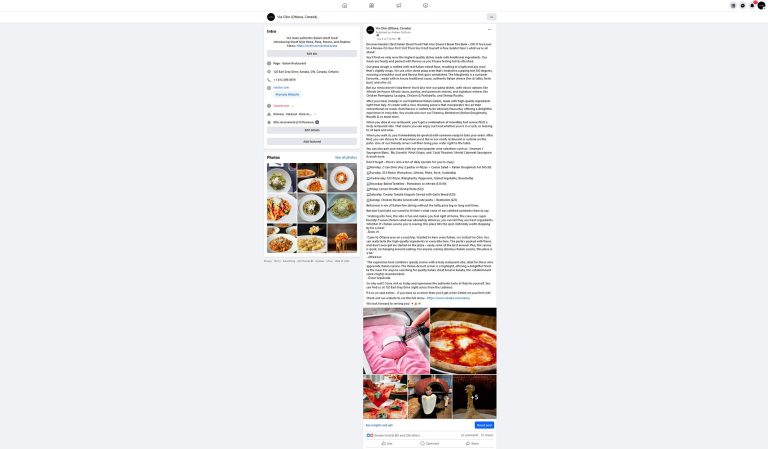
In this ad, I explain the flavours, what makes their restaurant unique, how big the portions are, the prices, daily specials, customer testimonials, AND what the dining experience is like from the moment you walk through their doors.
There’s no second guessing when the customer reads this ad. They feel fully informed and ready to try their food, all without making cute jokes or using ‘popular hashtags’. I pretend like I’m explaining this restaurant experience to a close friend, not a mindless fool.
But do people actually read it? This campaign launched 21-days ago, let’s take a peek at the results so far:
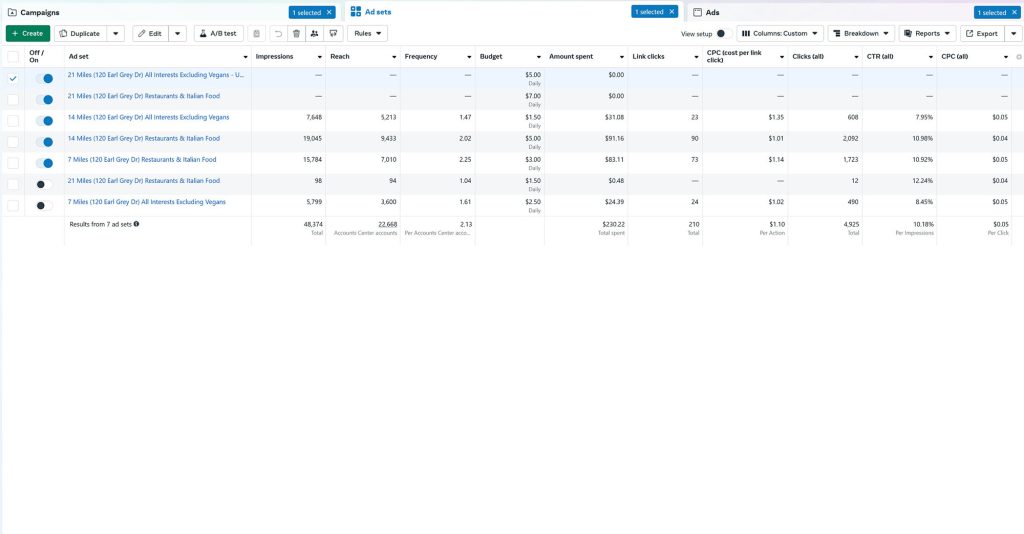
If they aren’t clicking, you should be rewriting it and trying another. Again, having good pictures is still crucial for an ads success, but it’s more important on what information you convey to the customer that counts.
The BEST METRIC is how much your sales increase.
Once you make a campaign that’s pulling in some big bucks… scale up the ad spend.
Google PPC ads for “restaurant near me” would have charged upwards of $6-$20 per link click in this area. What’s also great about social media advertising compared to Google PPC is that you get to see who is interacting with your ad instead of simply numbers on a screen.
I’m not saying Google PPC ads are useless, but for those looking to maximize their returns on ad spend with minimal budgets, this is by far the best way to go.
Side note: Facebook’s “ad recommendations” often prioritize you spending more money with them. I’d suggest you ignore most of these suggestions. Avoid using Facebook’s “call-to-action” button, which can make your ad appear less natural. You want to blend seamlessly into peoples feed as they scroll, so make your ad looks like how most people would post on social media.
Your ‘call to action’ should appear AFTER they’ve read your ad copy and are convinced to try your product or service. Example:
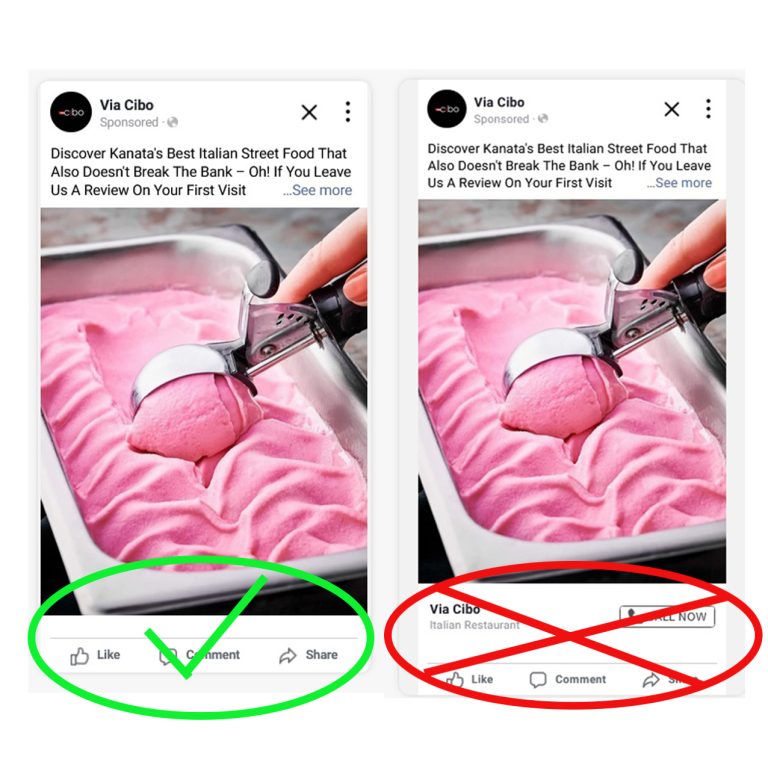
Now... Get Writing Folks
Your ads & website landing pages should be rife with information. That doesn’t mean dragging on about nothing, it means sharing the nitty gritty details that your customers NEED to know before they make a purchasing decision. Imagine if I sang a song to you like, “🎵Cyrus Media… the best agency in town!🎵” and then ran away. That would be stupid wouldn’t it?
You’d want to know my experience, pricing, client testimonials and EXACTLY what you would get when investing your hard-earned cash with my company.
So, next time you’re tempted to throw together a flashy post with zero substance, think again. Your audience deserves better. Give them the facts, show them the benefits, and watch your business grow. Because in the end – it’s about making that sale, plain and simple.
Should you want to learn how to write convincing ads yourself then this book by John Carleton is a great place to start – he will dispel the common myths most people have about advertising:
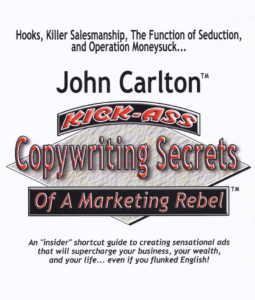
Let’s raise a toast to social media advertising that respects our intelligence and gets the job done.
